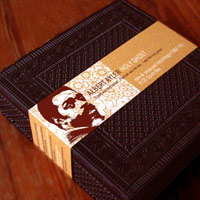
Albert Ayler: Holy Ghost box set.

"Trane was the father, Pharoah was the son. I was the holy ghost." - quote attributed to Ayler.
Revenant Records' impressive box set is an astonishing display of creativity and passion for one of the major figures of Free Jazz. From the impressive box itself to the wealth of music and words found within along with a pressed flowers and reproductions of playbills and posters from the era do much to advance further understanding of why Ayler's influence remains so strong.
Today I spent some time on only the first disc (there are nine, plus a bonus disc) and it already tells an impressive story of the creative ability, personality and astounding range of Ayler.
The opening three tracks are fairly tame. Ayler sitting in with the Herbert Katz Quintet in 1962 in Helsinki, Finland playing standards. His improvisations are short and stay pretty comfortably inside the harmonic framework. But his tone is already growling, just perceptibly threatening to break free. It makes for a pleasant warmup for the high intensity of the material that follows.
We flash forward five months in that same year and find Ayler confidently displaying his improvisational range along side Cecil Taylor in Copenhagen, Denmark. It's immediately apparent that Tayler and Ayler are temperamentally suited to play together as they blend their distinct voices into a sympathetic, other-worldly sound.
The first disc then completes it audible and historic journey with three tracks from New York in 1964 with Ayler's very own trio (including the unmistakable Sunny Murray on drums). This is Ayler's own music, his own voice and two fellow improvisers up to the task of realizing his uncompromising creative drive.
Nine discs to go and the first one has already proven to be worth the price of admission. Ayler takes the Free Jazz harmolodics of Coleman and drives such creative freedom several steps forward through the sheer force of his personality an expressive range that encompasses quiet reflection and near manic insanity. This is music that challenges one's sense of what improvisation can be. It achieves that Taylor-esque level of transcendence that is tinged with remorse for the martyrdom of this incredible player.


No comments:
Post a Comment